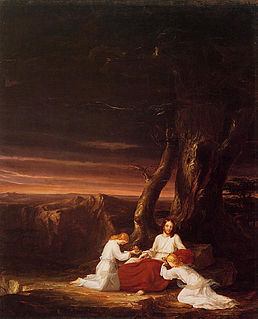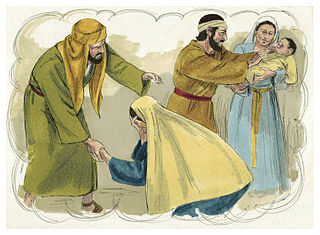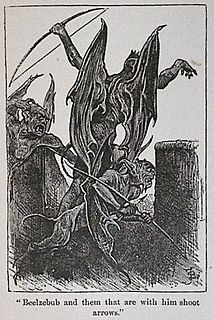Related Research Articles

Matthew 4:11 is the eleventh verse of the fourth chapter of the Gospel of Matthew in the New Testament. Jesus has just rebuffed Satan's third temptation and ordered him away. In this last verse of the temptation scene the devil departs and Jesus is serviced by angels.
Matthew 12:38 is a verse in the eleventh chapter of the Gospel of Matthew in the New Testament.
Matthew 9:33 is a verse in the ninth chapter of the Gospel of Matthew in the New Testament.
Matthew 9:34 is a verse in the ninth chapter of the Gospel of Matthew in the New Testament.

Matthew 8:29 is the 29th verse in the eighth chapter of the Gospel of Matthew in the New Testament.

Matthew 8:31 is 31st verse in the eighth chapter of the Gospel of Matthew in the New Testament.

Matthew 10:8 is the eighth verse in the ninth chapter of the Gospel of Matthew in the New Testament.

Matthew 10:25 is the 25th verse in the ninth chapter of the Gospel of Matthew in the New Testament.
Matthew 12:22 is a verse in the twelfth chapter of the Gospel of Matthew in the New Testament.
Matthew 12:25 is a verse in the eleventh chapter of the Gospel of Matthew in the New Testament.
Matthew 12:26 is a verse in the eleventh chapter of the Gospel of Matthew in the New Testament.
Matthew 12:27 is a verse in the eleventh chapter of the Gospel of Matthew in the New Testament.
Matthew 12:30 is a verse in the eleventh chapter of the Gospel of Matthew in the New Testament.
Matthew 12:28 is a verse in the eleventh chapter of the Gospel of Matthew in the New Testament.
Matthew 12:33 is a verse in the eleventh chapter of the Gospel of Matthew in the New Testament.
Matthew 12:29 is a verse in the eleventh chapter of the Gospel of Matthew in the New Testament.

Beelzebub or Beelzebul is a name derived from a Philistine god, formerly worshipped in Ekron, and later adopted by some Abrahamic religions as a major demon. The name Beelzebub is associated with the Canaanite god Baal.

Jesus exorcising a mute is the last of a series of miracles of Jesus recorded in chapter 9 of the Gospel of Matthew. It appears in Matthew 9:32–34, immediately following the account of Christ healing two blind men.
Matthew 12:31-32 are two verses in the eleventh chapter of the Gospel of Matthew in the New Testament.
Matthew 12:43-45 is a set of verses in the eleventh chapter of the Gospel of Matthew in the New Testament.
References
- ↑ Robert Witham, Annotations on the New Testament of Jesus Christ. Dublin: 1730.
- 1 2 "Catena aurea: commentary on the four Gospels, collected out of the works of the Fathers: Volume 6, St. John. Oxford: Parker, 1874. Thomas Aquinas".
 This article incorporates text from this source, which is in the public domain.
This article incorporates text from this source, which is in the public domain.